Landon Coleman's Blog, page 2
March 16, 2025
4 Reasons a Father Should Pray

First, pray for wisdom as a father (Proverbs 2:1-7, James 1:5-8). There are situations you experience as a father where it feels like there just isn’t a good option on the table. There are other situations you face as a father where you simply do not know what to do. So, pray for wisdom. The Bible assures God’s people that if they ask God for wisdom, and if they seek it like treasure, God will be faithful to grant wisdom to those who need it. Fathers, it seems “wise” to begin praying for wisdom now before a crisis hits and you’re left scrambling.
Second, pray for the salvation of your children (John 3:1-8, 1 Peter 1:3). There are many things you can do for your children as a dad. Saving your children from their sin problem and the wrath of God is not one of those things. You child needs to be born again, born from above. This new birth is the sovereign work of the Holy Spirit. It is not the result of human lineage or the will of a parent. Pray that God would do what only God can do – save your children. Pray that the Holy Spirit would be pleased to use your teaching to awaken your children to their need for salvation. Pray that God would give your children new hearts.
Third, pray for the spiritual protection of your children (Genesis 4:7, Ephesians 6:10-20, 1 Peter 5:8). Most fathers recognize the dangers that exist in the world today. In addition to external dangers like drugs, bullies, scammers, and predators, the Bible tells us that sin is crouching at the door of our hearts, ready to devour us. The Bible says we wrestle against the spiritual forces of evil in the heavenly places, and we are being hunted by the devil himself. The dangers that exist in this world are great, so pray for the spiritual protection of your children.
Fourth, pray for future generations of your family (Psalm 78:1-8, 2 Timothy 2:2). The immediate aim of fatherhood is raising children who know the Lord and walk faithfully with him. However, the end game for a father has to be longer and bigger than one generation of children. The book of Psalms calls fathers to teach their children in such a way that those children will be able to teach a generation that has not yet been born. Likewise, Paul urged Timothy to entrust the truth of the gospel to men who would in turn pass down the gospel to a new generation. Fathers, even now, pray for future generations of your family.
March 2, 2025
My 8 Favorite Books on Preaching

In this post I’m listing out my eight favorite books on preaching, but I’m dividing those books into two lists. List one contains comprehensive books on preaching. List two contains niche, focused books on preaching. Here’s the lists.
List One (Comprehensive):
Christ-Centered Preaching, by Bryan Chappell. When I taught a group of men at my church how to preach, this was the book I assigned. A classic. Biblical Preaching, by Haddon Robinson. Another classic. Robinson’s chapter on “The Big Idea” is really, really helpful. It has shaped my preaching. Between Two Worlds, by John Stott. An older book, but a classic. The idea that preaching is “bridge building” between two worlds is a powerful idea. Lectures to My Students, by Charles Spurgeon. What list on preaching books would be complete without a contribution from the Prince of Preachers?!List Two (Niche, Focused):
Preaching that Moves People, by Yancy Arrington. This short book helped me think through the delivery and flow of my sermons in a new way. Helfpul!Small Preaching, by Jonathan Pennington. This is a short book with short chapters that contain big ideas about how to improve as a preacher. Unleashing the Word, by Max McLean. Not a book on preaching, but a great challenge on preparing to read the Word of God in a public setting. Great Leader, Great Teacher, by Gary Bredfeldt. Not a book on preaching, but a reminder that the primary leaders of God’s people are preachers.February 16, 2025
It’s All Grace

The following post is an excerpt from Hope to Win the War, by Jacob Way.
One of the lies that enslaves us to pornography is believing that God will only help us fight temptation if we’ve earned it. Believing this lie causes us to never pray or ask Him to intervene, because we are never good enough. We never meet the standard we think God has for us in order to ask Him for help. In order to dismantle the lie of earning God’s help, the first step is returning to basics. We must remember the fundamentals of our faith.
Let’s start at the beginning. Did we do something to make God notice us? Did we cause Him to choose us? Did we earn God’s favor? No! Paul stated in Ephesians 1 that God chose us in Him before the creation of the world to be holy and blameless in His sight. In love, He predestined us for adoption to sonship through Jesus Christ (Ephesians 1:4-5). You weren’t born and then did some cool things to get God’s attention. It is not like you had great stats in high school, so God recruited you to play sports in college. No, God chose you before He made you. God chose you before He even made the world.
Why did He choose you? Was it what you can do for Him or your potential contributions to the kingdom? No, not at all. It was love. Was it because you loved Him? No, you weren’t made yet. It was only His love for you.
So, if you didn’t earn His attention, do you have to get all A’s in the Christian life to keep His attention? Nope. Paul explains in Ephesians 1:6 that what accompanies God’s love for us is His “glorious grace, which he has freely given us.” His grace has no strings attached. It is unconditional. You don’t have to perform well to not get cut from the team. You are a starter, not based on your ability but on God’s compassion for you.
What about our faith? Don’t we earn that? No. “For it is by grace you have been saved, through faith—and this is not from yourselves, it is the gift of God—not by works, so that no one can boast.” (Ephesians 2:8-9)
Notice that it isn’t just God’s grace that is a gift to us; even our faith is a gift. The faith you have is not from yourself. You did not create it, and you do not primarily maintain it. It’s from God and preserved by Him. We can’t brag about our faith because even that is an act of grace to us. He gives us the ability to love Him and gives us the gift of faith and reconciliation with Him.
It is all a gift. If God’s attention, His love, His grace, and our faith are all gifts, what did you earn? What are you worried about losing?
The riches of God’s gifts flow from His character of love and mercy. We could never earn or deserve all that God gives us. He just gives them to us because He loves us. This is the fundamental starting point and continual state of our relationship with Christ. Therefore, the foundation of our whole existence and identity is rooted in God’s unmerited grace to us.

February 2, 2025
7 Signs the Holy Spirit Is at Work in a Church

Recently, I’ve been preaching through the book of Romans at my church, Immanuel Baptist in Odessa. As we’ve worked through Romans 8 and listened to Paul talk about the role of the Holy Spirit in our individual sanctification, I’ve found myself asking the following question: “What would it look like for the Holy Spirit to be at work in the life of a particular congregation?” In other words, if the Holy Spirit was truly present with us and active among us, what signs or evidences would we see of his presence and activity?
Some would look for passionate singing, people raising their hands in worship, maybe even people bowing down during worship. These folks would cite a phenomenon like the 2023 “Asbury Revival” in Wilmore, Kentucky. As best I can tell, the predominant feature of this revival was a prolonged worship service where an ever-changing group of students refused to leave the chapel.
Others (of a more charismatic stripe) would look for some kind of wild activity like people running the aisles, people speaking in tongues, or people laughing hysterically. Some in this group would look for signs and wonders, people being slain in the Spirit, prophetic words, and dramatic healings. Still others in this group would expect exorcisms and encounters with demons.
To be clear, my question is less based on experience and more based on Scripture. Based on the biblical teaching about the person and the work of the Holy Spirit, what would we expect to see, hear, and experience if the Holy Spirit was truly at work in a local congregation. I think Scripture points us to at least 7 realities.
The people of God will be focused on the Word of God. Jesus described the Holy Spirit as the “Spirit of truth” who would help the disciples remember the things Jesus taught (John 14-16). Luke tells us the early church was devoted to the apostles’ teaching (Acts 2:42). Paul clearly says that the only people who can receive the truth of God are the people who have the Spirit and are taught by the Spirit (1 Corinthians 1:11-16). Most importantly, the Bible itself claims to be authored by the Holy Spirit working through human authors (2 Timothy 3:16-17, 2 Peter 1:20-21). Make no mistake, when the Holy Spirit is at work in a church, the people of God will be hungry – not for dreams and visions and words of prophecy – but for the Spirit inspired Word of God. People will feel deep, genuine, abiding conviction of sin. In John 16 Jesus spoke plainly about his “going away” so that the Helper could come to the disciples. Speaking about the Holy Spirit, Jesus promised, “when he comes, he will convict the world concerning sin and righteousness and judgment.” (John 16:8) Only the Holy Spirit can work conviction that is deep, genuine, and abiding. By way of contrast, man is quite capable of manipulating shallow, manufactured, temporary feelings of remorse. Paul talks about this very issue in 2 Corinthians 7 when he contrasts “godly grief” that is brought about by the Holy Spirit and “worldly grief” that only ends in death. When the Spirit is at work in a congregation, the people in that congregation will experience “godly grief” that leads to repentance and life. The miracle of regeneration will result in conversions. In the Old Covenant, the prophet Ezekiel looked forward to the day when the Spirit of God would remove hearts of stone and replace them with hearts of flesh (Ezekiel 36). He looked forward to a day when the Spirit of God would bring life to those who were hopelessly dead in sin (Ezekiel 37). That hope was brought to fruition in the work of regeneration (John 3). Jesus told Nicodemus that no one would see the kingdom unless they were born again, and he explained that this new birth was the work of the Spirit of God. The new birth is God’s work (1 Peter 1:3), and it is a work that God brings about through the preaching of the Word of truth (James 1:18). Left to ourselves we are dead in sin, but the miracle of regeneration gives us life that leads to faith in Christ (Ephesians 2:1-10). When the Spirit is at work, blowing like the wind and granting new birth, people who are dead in sin will be converted and saved. The people of God will fix their eyes on Jesus. All too often, churches that boast about the work of the Holy Spirit have their eyes fixed on the Holy Spirit. Jesus, however, clearly told his disciples that it was the work of the Holy Spirit to glorify the person and work of God the Son – “He will glorify me,” Jesus said (John 16:14). This focus on Jesus fits perfectly with Paul’s teaching in Romans 8 where we learn that the Holy Spirit is given to us to help us in sanctification. That is, it is the work of the Holy Spirit to conform the people of God to the image of the Son of God (Romans 8:29). This is why Paul can say “for those who love God all things work together for good.” (Romans 8:28). It’s also why the author of Hebrews can confidently call the people of God to fix their eyes – not on the Holy Spirit – but on Jesus, the author and the perfector of our faith (Hebrews 12:1-2). When the Spirit is at work in our midst, he will call us to look to Jesus.The people of God will be serious about killing sin. Romans 8:13 is one of the most challenging texts in all of Scripture – not because it’s hard to understand, but because of the call it places on our lives. Paul says, “For if you live according to the flesh you will die, but if by the Spirit you put to death the deeds of the body, you will live.” (Romans 8:13) This isn’t legalism or Phariseeism or works-based-salvation. Paul has laid those charges to rest in Romans 3-5. Paul here is simply explaining what will happen in the life of a person who has trusted in Jesus and received the gift of the Holy Spirit. They will kill sin. Paul’s teaching here in Romans 8 is echoed in Galatians 5 and 1 Corinthians 6. Believers will walk with the Spirit and not according to the works of the flesh. Believers are the temple of the Holy Spirit, and their lives will increasingly reflect the holiness of the Spirit. Rest assured, those who are experiencing the ongoing work of the Holy Spirit will be serious about obedience, discipleship, and holiness. The people of God will be passionate about missions. After his death and resurrection, Jesus spoke the words we commonly know as “The Great Commission” … “All authority in heaven and on earth has been given to me. Go therefore and make disciples of all nations, baptizing them in the name of the Father and of the Son and of the Holy Spirit, teaching them to observe all that I have commanded you. And behold, I am with you always to the end of the age.” (Matthew 28:18-20) How is it that Jesus, who was going away and ascending to heaven, would be “with” his disciples to the end of the age. Clearly the book of Acts indicates that the promised presence of Jesus became a reality in the sending of the Holy Spirit. Matthew 28 reminds us that the precious promise about Jesus’ presence is directly tied to the clear command to make disciples. Thus, those who enjoy the presence of Jesus through the person of the Holy Spirit will be people committed to making disciples of all nations. The people of God will long for the return of Christ. Throughout Romans 8, as Paul talks about the work of the Holy Spirit in our sanctification, Paul also points us forward to the future hope of Christ’s return, the resurrection of our bodies, our heavenly inheritance, and our final glorification. Paul points to this future hope in Romans 8:11, reminding us that the Spirit who dwells in us now will raise our bodies in the future work of glorification. He also points to this hope in Romans 8:17, when he talks about the Spirit’s work of assuring us of our adoption and our future inheritance – an inheritance that will be ours when we are “glorified with him.” Paul circles back to this same point in Romans 8:26-30 where he begins by telling us the Spirit helps us in our weakness and concludes by talking about the certainty of our future glorification. When the Spirit is at work in a church, that church will long for the return of Christ and the glorification of believers (Revelation 22:20).January 19, 2025
The God of “Re”

The following post is an excerpt from Hope to Win the War, by Jacob Way.
Blaming God for your porn addiction?
One lie I believed about pornography was that it was God’s fault! Had He not created the sex drive, I wouldn’t be caught in this sin. So, what gives? Didn’t God just make me this way?
Let’s examine why blaming your addiction on the way God created you is flawed.
What we are now, what the world is now, is not only the result of God’s purposeful design. The design of creation, the original intent, has been fundamentally altered by sin. All of creation has been corrupted and scarred by the choice in the Garden. “God made me this way” is not true. Yes, you are made in the image of God, and even though sin has damaged it, the image is still there.
However, sin has defiled who you are at your core. Your nature and identity have been compromised. Therefore, claiming that unrestrained sexual desire is natural misses the whole story of the Bible. God did make all things good, but because we sinned, we ruined the perfect state of ourselves and the world. Humanity and creation could not get out of the hole we dug ourselves into, so we needed a Savior to save us. Therefore, God entered into His own fallen creation to redeem it and purchase it back for Himself. This is the biblical understanding of the state of all things.
The Rescuer
Please don’t hear a hopeless tale. I’m not telling you that things are bad and that you are flawed and leaving it there. God’s modus operandi is about taking the broken and mending it. He is in the fixing business. In fact, consider all of the things Jesus is doing through His perfect life, death, burial, and resurrection.
He is re-deeming a people for His own possession.He is re-conciling us back to God the Father.He is re-claiming this world from the Devil.He re-generates us by the Holy Spirit.He makes us re-born to see the kingdom of God.He re-freshes our souls.He helps us to re-new our minds continually with His Word.He re-stores our right relationship with Him.He is the God of second, third, and 500th, re-starts by His promise to always forgive confessed sin.It is okay to approach God in brokenness. You are not burdening Him with your failure. We don’t go to God because we are perfect; we go to Him, and He makes us perfect. Additionally, God loves to do this.
He delights to cleanse us and act on our behalf.He rejoices in healing the broken.He rejoices in being the Savior for His people.He rejoices in breaking the chains of your addiction.He is the fixer of impossible situations. He parts the Red Sea. He called manna from Heaven. He restores sight to the blind and makes the lame walk. He defeated death and the power of sin, and right now, He is taking the weak and making them strong. He is taking sinners and making them saints.
He is all about re-claiming His creation and re-storing it to its original design, to perfectly reflect the glory of God. He is doing that even as I type this and you read it. Jesus is making all things new. Nature isn’t perfect now, but it will be one day. You are not perfect yet, but you will be one day, all because Jesus delights in being the God of “re.”

January 5, 2025
5 Great Books on the 5 Points of Calvinism

Of course, if you want to know what John Calvin taught, you should read Calvin himself. His classic work Institutes of the Christian Religion, along with his many commentaries on individual books of the Bible are available and accessible.
Most people who are familiar with the name John Calvin immediately associate him with the so-called “five points of Calvinism” (aka, T.U.L.I.P.). These five points were actually codified in 1618 at the Synod of Dort in response to the arguments of Arminian theologians. For those who want to study the “Five Points,” here are five helpful books.
By His Grace and for His Glory by Thomas Nettles. This book was my first written introduction to the five points. Nettles is a leading Baptist theologian and historian. This book is part historical survey, part exposition of the doctrines of grace. What Is Reformed Theology, (or, Grace Unkown), by R.C. Sproul. Sproul was such a gift to the church. His understanding of theology was matched by his love for the gospel and his ability to communicate the truth of God’s Word to God’s people. This is a great book!The Doctrines of Grace, by James Montgomery Boice and Philip Graham Ryken. This book was Boice’s last before dying of cancer. The book itself wasn’t completed when Boice died, so his successor at Tenth Presbyterian Church finished the book. Mere Calvinism, by Jim Scott Orrick. Orrick, like Nettles, is a Baptist. He is a pastor and a professor. His writing is clear and thoughtful. Orrick explains that Calvinism is more than five points, and he warns about settling for less than the five points. Five Points, by John Piper. Piper is likely the best known pastor-theologian-author on this list, and this book is the shortest on this list. In short, succinct chapters, Piper discusses history, theology, and ends with a personal testimony about Calvinism.A bonus book for your consideration is Redemption Accomplished and Applied, by John Murray. This book isn’t focused specifically on the five points. It is, however, a reformed, Calvinistic presentation of soteriology. It is also a book that deals with the ordo salutis (order of salvation).
December 15, 2024
Far as the Curse Is Found

The following post was written by Jacob Way.
One thing I love about Advent is the music accompanying the season. These impressionable tunes are catchy and intertwined with childhood memories that fuse together my mind. Each listen of a Christmas song is like a resurrection of these fond memories. One such memory is our church’s annual candlelight Christmas Eve service. There was always a medley of Christmas songs that began with “Joy to the World.” I love the triumphant declaration of the first chorus.
Joy to the world! the Lord is come; Let Earth receive her King; Let every heart prepare Him room; And heaven and nature sing, and heaven and nature sing, and heaven, and heaven and nature sing!
In our Christmas Eve service, the worship team would usually transition from this verse to another song. Believe it or not, I had never heard all of the verses to “Joy to the World.” It wasn’t until a couple of years ago I listened to the third verse and was struck by the profound depth of theological truth.
No more let sins and sorrows grow, Nor thorns infest the ground; He comes to make His blessings flow far as the curse is found, far as the Curse is found, far as, far as, the curse is found!
When I first heard this glorious third verse, I was immediately struck by the reality that we were singing about the very reason for joy – that Jesus comes to make His blessings flow far as the curse is found!
This reference to the curse, of course, is a reference to the curse God placed on creation as a result of Adam’s sin in the garden. When Adam sinned, not only did he sever mankind’s perfection and right standing with God – he also introduced sin into the world. One of the immediate consequences was the introduction of death. Before the Fall, death was not part of God’s good and perfect creation. However, because the “wages of sin is death,” death now reigns in the created order. All God’s created beings will die. This death is manifest in both the spiritual and physical realms. Man is born spiritually dead (Ephesians 2), and man will also experience physical death.
Additionally, God told Adam, “The ground is cursed because of you.” (Genesis 3:17) Adam would now till the Earth in “painful labor.” (Genesis 3:17) This labor would be difficult because the ground would “produce thorns and thistles.”(Genesis 3:17) All of creation has been brought under this curse. Our current agricultural products are inferior to what they were intended to be. The high yields of wheat in summer are less than they were created to produce. The tasty strawberry in summer is less sweet than God intended. That beautiful sunrise was intended to be more beautiful than it is, and the smell of wildflowers doesn’t compare to their pre-fall aroma.
According to Scripture, there is a sense in which nature itself is aware of the curse. Paul writes, “For the creation eagerly waits with anticipation for God’s sons to be revealed. For the creation was subjected to futility—not willingly, but because of him who subjected it—in the hope that the creation itself will also be set free from the bondage to decay into the glorious freedom of God’s children.” (Romans 8:19-22)
Praise God, the story of this world doesn’t end with a curse. Advent is the celebration of the incarnation – the Son of God who came to dwell among us. The Creator of all things who came to make all things right. Jesus came to make blessings flow as far as the curse is found!
What are these flowing blessings? A created order that is restored to its original design. Sinful people forgive and made right with their Creator through the blood of Jesus. Shalom.
This is the theme of the majestic third verse of “Joy to the World.” This often neglected verse reminds us of the scope of Jesus’ redemptive power. Christmas is about the Son of God coming to Earth to save and reclaim that which is His. His birth, death, and resurrection assure us that one day all will be made right and we will enjoy Him and His creation forever. May we sing these words with great joy!
Joy to the world! the Lord is come; Let Earth receive her King; Let every heart prepare Him room; And heaven and nature sing, and heaven and nature sing, and heaven, and heaven and nature sing!
No more let sins and sorrows grow, Nor thorns infest the ground; He comes to make His blessings flow far as the curse is found, far as the Curse is found, far as, far as, the curse is found!
December 1, 2024
3 Great Books on The Apostles’ Creed
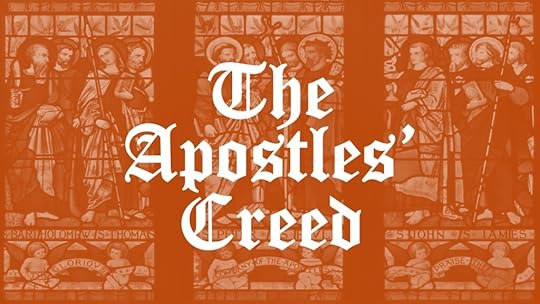
Lord willing, in the spring of 2025, we plan to teach a series on the Apostles’ Creed at Immanuel. Our adults, college students, and youth will all participate in this series. In preparation for this series, I purchased several books on the Apostles’ Creed. The following three are my favorites, with one bonus book thrown in for good measure.
One, The Apostles Creed, by R. Albert Al Mohler … Mohler has used his preaching / teaching opportunities in chapel services at Southern Seminary to work through the Lord’s Prayer, the Ten Commandments, and the Apostles’ Creed. The overflow of his preparation and sermons has been books on each topic. Mohler’s book on the Apostles’ Creed is immensely helpful.
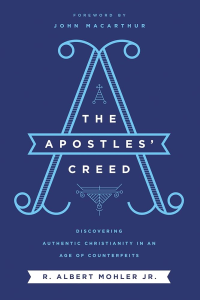
Two, Affirming the Apostles’ Creed, by J.I. Packer … Packer was one of the greats. His writing is concise, clear, clever, and always biblical. Packer’s book on the Apostles’ Creed is very short and highly structured. In preparing to teach, I found Packer’s overall approach the most helpful in the formation of teaching outlines. This book is a must read for those teaching.
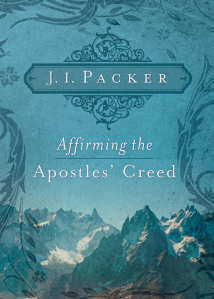
Three, What We Believe, by R.C. Sproul … Like Packer, Sproul was one of the greats. His writing is a unique combination of scholarship and clarity. Sproul’s book likely won’t translate directly to a teaching outline for most pastors. However, Sproul’s examples and apologetic approach offers helpful ideas for those who are trying to teach the Apostles’ Creed in a church setting.
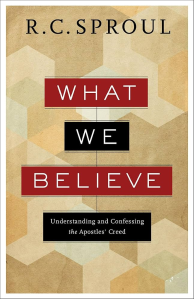
Bonus, Crisis of Confidence, by Carl Trueman … To be fair, this book isn’t specifically about the Apostles’ Creed. It is, however, about the importance of creeds and confessions in the corporate life of the church and the individual lives of believers. Trueman’s book offers a helpful defense of creeds in general, and many evangelicals will need to hear such a defense.
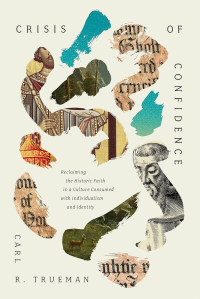
November 17, 2024
Taking Away the Secrecy of Pornography

The following post was written by Jacob Way.
One of the ways pornography enslaves us is that we simply don’t talk about it. It’s crazy, something so omnipresent, but we are all too scared to bring it up. Whether it is our pride, shame, or fear, we allow pornography to enslave each of us alone. But this is exactly what the enemy wants.
“Sin thrives in secrecy.“
Sin thrives in secrecy. Just think about when you were a kid and wanted to do something you weren’t supposed to. If you wanted to raid the freezer and eat some popsicles, even though your mom said not to, you first waited until you were alone. Then you sneaked into the garage. Before opening the freezer, you looked around one more time to ensure that no one was watching. Then, you devoured the popsicle and hid the evidence to avoid getting caught.
The same is true with pornography. To indulge, you have to seclude yourself. You cut off contact with friends and family. You are alone. You look around, make sure no one is watching, and find ways to destroy the evidence afterward.
Knowing this, why do we continue to struggle in secrecy? There is shame and pride, of course, but secrecy allows sin to continue. Secrecy is the environment where sin thrives.
One reason porn addiction lingers so long is we are fighting it alone. It’s crazy. Something that is so pervasive, and we convince ourselves that we are the only ones struggling. Ironically, most men and women who struggle with porn believe no one else is. Isolated and alone, they remain slaves.
If someone just admitted their struggle to someone else, it would shatter this illusion. That’s why sharing your story is so impactful. The more we talk about it, the more people realize they aren’t the only ones struggling. Sometimes all we need to be vulnerable is to know someone else is fighting the same battle. Then, instead of being addicts, separated and alone, we can be addicts fighting for recovery together.
If you’re looking for a book to help in the battle against pornography, check out Hope to Win the War, by Jacob Way.

November 3, 2024
The Confessions of Augustine

First, I am more than a bit embarrassed that I made it through two seminary degrees and almost twenty years of pastoral ministry without reading The Confessions of Augustine. Second, the portions of this book relating to Platonism, the world of memory, ideas, forms, and time are challenging for readers who are not accustomed to thinking about reality on Platonic terms. Third, this book is truly and remarkably insightful with respect to the character of God, the nature of man, and the grace of God that changes our wills. Fourth, consider the following quotes, and consider reading The Confessions for yourself!
“For Thou hast made us for Thyself and our hearts are restless till they rest in Thee.” (I:I, pg 2) … Perhaps the most famous quote from The Confessions.“I have dared to say that You were silent, my God, when I went afar from you.” (II:III, pg 31) … Augustine remembering how he blamed God for his silence when Augustine was the one running from God. “I know that it is only by Thy grace and mercy that Thou hast melted away the ice of my sins. And the evil I have not done, that also I know is by Thy grace: for what might I not have done, seeing that I loved evil solely because it was evil?” (II:VII, pg 37) … Augustine praising God’s sovereign grace.“Time takes no holiday, it does not roll idly by, but through our senses works its own wonders in the mind.” (IV:VII, pg 71) … Augustine writing about the role time plays in the experience of grief (he had recently lost a close friend).“Wherever the soul of man turns, unless towards God, it cleaves to sorrow, even though the things outside God and outside itself to which it cleaves may be things of beauty.” (IV:X, pg 73) … Augustine explaining that good things elevated to God-status lead only to sorrow, not joy. “Receive the sacrifice of my confessions offered by my tongue which Thou didst form and hast moved to confess unto Thy name.” (V:I, pg 88) … Augustine confessing truth about his ability to confess sin.“All unknowing I was brought by God to him, that knowing I should be brought by him to God.” (V:VIII, pg 108) … Augustine speaking about his move to Milan where he would meet Ambrose who would lead him to Christ.“I was to utter any number of lies to win the applause of people who knew they were lies.” (VI:VI, pg 121) … Augustine writing of his work of teaching rhetoric and giving speeches.“The plain truth is that I thought I should be impossibly miserable if I had to forego the embraces of a woman: and I did not think of Your mercy as a healing medicine for that weakness, because I had never tried it.” (VI:XI, pg 131) … Augustine describing his hesitancy to convert.“For no soul ever has been able to conceive or ever will be able to conceive anything better than You, the supreme and perfect Good.” (VII:IV, pg 144) … Augustine reflecting on the character of God in terms that Anselm would later use in the so-called ontological argument for God. “I sought for the origin of evil, but I sought in an evil manner, and failed to see the evil that there was in my manner of enquiry.” (VII:V, pg 145) … Augustine reflecting on how his own sin tainted his questions about sin.“For in that instant, with the very ending of the sentence, it was as though a light of utter confidence shone in all my heart, and all the darkness of uncertainty vanished away.” (VII:VII, pg 195) … Augustine describing his conversion after reading Rom 13:13-14 in the courtyard of a monastery.“But You, Lord, are good and merciful, and Your right hand had regard to the profundity of my death and drew me out of the abyss of corruption that was in the bottom of my heart. By Your gift I had come totally not to will what I willed but to will what You willed.” (IX:I, pg 198) … Augustine attributing his conversion to God’s mercy and saving power. “Men are a race curious to know of other men’s lives, but slothful to correct their own.” (X:III, pg 231) … Augustine describing human nature in a way that seems remarkably contemporary. “All my hope is naught save in Thy great mercy. Grant what Thou dost command, and command what Thou wilt.” (X:XXIX, 259) … Augustine describing the dynamic between the freedom of our wills and the commands of God, especially as it relates to our salvation and growth in holiness. “On the whole I am inclined … to approve the custom of singing in church, that by the pleasure of the ear the weaker minds may be roused to a feeling of devotion. Yet whenever that happens that I am more moved by the singing than by the thing that is sung, I admit that I have grievously sinned, and then I should wish rather not to have heard the singing.” (X:XXXIII, pg 267) … Augustine arguing for the recent practice of congregational singing, while also admitting that music can easily control our emotions apart from the doctrinal truths we are singing.


